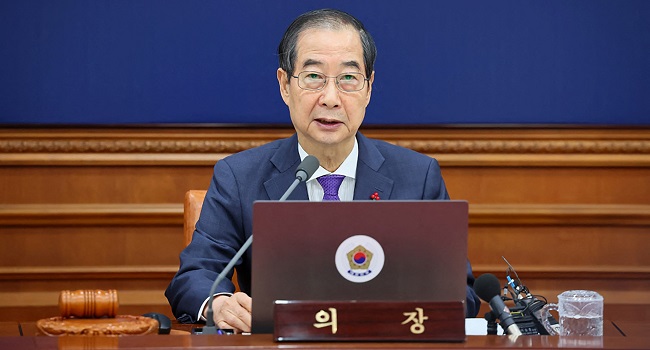Constitutional Court Quorum at Heart of Political Standoff
South Korea’s opposition party announced on Thursday that they have initiated an impeachment process against Acting President Han Duck-soo amid a deepening political crisis. This follows the suspension of President Yoon Suk Yeol, who declared martial law on December 3, leading to his impeachment by parliament on December 14. The Constitutional Court, which must uphold the parliamentary decision to finalize Yoon’s removal, is currently understaffed, lacking three of its nine justices.
Judicial Appointments and Political Deadlock
The opposition demands that Han appoint three new judges to complete the court’s panel, a move Han has resisted unless there’s a consensus between his People Power Party (PPP) and the opposition. Han insists that significant presidential powers, such as appointing constitutional officials, should only be exercised with mutual agreement from both political factions in the National Assembly.
Impeachment Motion Details
Democratic Party MP Park Sung-joon confirmed the filing of the impeachment motion against Han, with a vote scheduled for the next day. The party’s floor leader, Park Chan-dae, argued that Han’s reluctance to appoint judges shows a lack of commitment to constitutional duties. The opposition’s motion accuses Han of dodging responsibilities, including not endorsing special investigations into Yoon’s martial law decree and corruption allegations against his wife, Kim Keon Hee.
READ ALSO: JUST IN: Azerbaijan Mourns After Deadly Plane Crash in Kazakhstan
Potential Historical Precedent
If the motion passes on Friday, it would set a historical precedent as the first impeachment of an acting president in South Korea. Should Han be impeached, Finance Minister Choi Sang-mok would assume the role of acting president.
Legal and Political Repercussions
The impeachment motion claims Han has breached his public duty, emphasizing his refusal to support probes into the previous president’s actions. Simultaneously, Yoon faces serious criminal charges for his martial law declaration, with potential penalties including life imprisonment or the death penalty. His refusal to cooperate with legal proceedings, including missing a Christmas Day summons, has added to the political turmoil.
This sequence of events underscores a volatile period in South Korean politics, with the resolution of these issues likely to have significant implications for the nation’s governance and legal framework.










